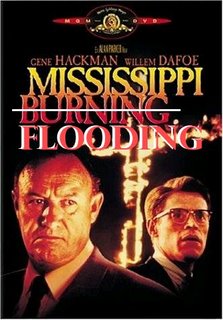
"The Mississippi case underscores something that Florida legislators should understand: by abrogating Florida's Valued Policy Law, they have created a huge disincentive to evacuate as a storm approaches, and thus have put tens of thousands of lives at risk."There isn't much of a surprise in yesterday's Mississippi federal court ruling that Bill and Julie Leonard's Nationwide Insurance Co. policy, properly interpreted and applied to the facts of their case, excludes damage caused exclusively by flooding waters in Hurricane Ivan.
That's the bad news for home owners. The good news is the emphasis belongs on the word "exclusive."
The full text of Judge L.T. Sentner Jr.'s legal opinion in Leonard vs. Nationwide is available in pdf format here.
Today, Nationwide is crowing that it has scored a knock-out punch against all of its Mississippi customers. "We are very pleased that the court ruled in our favor and upheld the long-standing flood exclusion language which is foundational to traditional homeowner policies across the country," Nationwide says in a press release.
Insurance industry flak-catchers claim to be equally thrilled:
"In the insurance coverage debate over wind vs. water, Judge Senter’s ruling has taken much of the wind, literally and figuratively out of the plaintiff attorney’s argument," said Ernie Csiszar, president and CEO of the Property Casualty Insurers Association of America (PCI). "Judge Senter has made it very clear that the flood exclusion applies to storm surge."Not so fast. It seems the Leonards' lawyer, Dickie Scruggs, says he's happy, too. Speaking of the Leonards, Scruggs told a South Mississippi television station, "The judge ruled in favor of this family."
So who's right? The Jackson (MS) Clarion Ledger comes close to nailing it down today when it editorializes, "The ruling... is a total victory for neither side... ."
The court's opinion is only 13 pages long. Most of it is very fact-specific. As the Mississippi Press is reporting:
The Leonards, who live two blocks north of the Mississippi Sound, said Katrina caused approximately $130,253 in total damages. They said $47,365 in damage was caused by wind. Citing that storm surge caused the rest of the damage, Nationwide paid the couple only $1,661.Following a complete court trial, the judge ordered the insurer to pay the Leonards another $1,228.
If you analyze your court decisions using only dollar signs, that sure looks like the Leonards lost. But there is more to the court decision than just money.
The outcome of this case turned on the particular facts of the Leonards' purchase of a standard homeowner's policy and two legal principles of ordinary contract law which Judge Sentner applied. It's how the judge applied those principles that explains why attorney Scruggs can see some advantage for future cases, if not this one.
Insurance Agent Negligence?
As for how the Leonards found themselves without a flood insurance policy in the first place, it seems their insurance agent likely advised against buying it. At trial, however, the judge says the Leonards failed to introduce any evidence about whether that advice was, in effect, professionally negligent. As the court opinion states:
There is no evidence in the record to establish the standard of care applicable to an insurance agent who is asked about the advisability of purchasing flood insurance. Absent proof of this standard of care, there is insufficient evidence to support a finding that [the agent] Fletcher's statements to Paul Leonard indicating that he (Leonard) did not need to purchase a flood insurance policy breached a standard of care that governed Fletcher’s conduct as an insurance agent in these particular circumstances.It's unlikely Dicky Scruggs will make the same mistake twice. He already has on file two to three thousand other lawsuits-to-follow in the wake of Hurricane Katrina -- including one for Republican U.S. Senator Trent Lott, a frequent critic of plaintiffs' lawsuits when they're brought by someone other than himself. Where the facts show another customer was left uninsured against flood damage because an insurance agent gave bad advice, the results of future trials could be dramatically different.
Contract Law Principles
As for the two principles of insurance contract law that were determinative of the Leonards' claim against Nationwide Insurance Co., these are unremarkable rules of law that have come down to us over the centuries as familiar legal principles of the common law. What's new is their application to hurricanes:
- When a property insurance policy contract explicitly excludes coverage for damage caused by a flood, a clear expression of that exclusion is lawful and the courts will enforce it as to all damage caused exclusively by flooding water. (Score one for the insurance industry.)
- However, when the insurance contract covers windstorms but paradoxically purports to exclude damage caused by a combination of wind and water during a windstorm, the policy exclusion becomes "ambiguous." Then, the court will reinterpret the policy "reasonably" to mean that the insurance company must cover that portion of combined damage during a windstorm which is attributable to the effects of wind, as shown by the evidence. As the Judge wrote:
"The most reasonable interpretation for these conflicting policy provisions is that this policy provides coverage for windstorm damage, in accordance with its terms, and that coverage is not negated merely because an excluded peril (in this case storm surge flooding) occurs at or near the same time."
(Score one for the homeowners.)
 In the end, the Leonard decision stands for the proposition that under insurance contracts like those written in Mississippi, a windstorm insurer remains liable for windstorm damage even if it occurs in combination with flooding, but it is not liable for damage caused only by flooding.
In the end, the Leonard decision stands for the proposition that under insurance contracts like those written in Mississippi, a windstorm insurer remains liable for windstorm damage even if it occurs in combination with flooding, but it is not liable for damage caused only by flooding.That's essentially the same rule we live with in Florida.
The real winners of the Mississippi ruling may be all the expert witnesses who can now look forward to decades of steady income. With a premium placed on admissible court evidence about concurrent causes, they'll be busy offering opinion testimony for years about what their post-storm analysis shows in one case after another: which wall studs were wrecked by water and which were destroyed by wind, how far open a door was torn by wind and the extent to which that same door was opened wider by water, etc., etc., etc.
Unintended Consequences
One consequence of the Mississippi ruling doubtless is that more people than ever before who live within reach of hurricanes will buy flood insurance to supplement their wind coverage. That's good.
But another is that the disincentive for Mississippi homeowners to evacuate in advance of a storm has been greatly increased. That is very bad, indeed.
The artificial wind-versus-water distinction insurance companies write into their policies actually puts more lives at risk. Consider the predicament of every Floridian whose home is destroyed in a hurricane. Before July 2005, state-regulated windstorm carriers in this state were required by the century-old Valued Policy Law to pay policy limits when a home was totalled by a hurricane, even if there was evidence of a concurrent cause like flooding water. Having paid the homeowner, a windstorm company then could seek "contribution" (in effect, partial reimbursement) from any flood carrier for such damage as could be shown attributable to water.
Under the Valued Policy Law, there was no economic reason for a Floridian to stay at home if a hurricane threatened his house. Insurance claims were settled quickly and all the nasty expert witness fights over concurrent causes in Florida were left for the insurance companies to thrash out among themselves after the consumer was paid.
Insurance companies are good at thrashing out that kind of stuff between themselves. They do it all the time. Most also have on retainer a huge stable of experts accustomed to parsing causes in retrospect and testifying to whatever opinions the employing company may require.
Following the Florida state legislature's contemptible abrogation of the Value Policy Law last year, however, we're now in the same fix as Mississippians. It's the homeowner who has to come up with hard, admissible evidence in every "concurrent cause" case.
That means one of two things: either hire an expert witness after the storm to come up with an educated guess (called "opinion evidence") about what was damaged by which cause; or rely on eyewitness testimony to the sequence, cause, timing, and extent of destruction. Expert witnesses don't come cheap. After a large storm they may not come quickly, either, at least not for your average homeowner.
Consequently, the Mississippi case underscores something that Florida legislators should understand: by abrogating Florida's Value Policy Law in 2005 they created a huge disincentive to evacuate as a storm approaches.
Thus, the legislators who voted to amend the Valued Policy Law have put tens of thousands of lives at risk. It's the same disincentive now facing Mississippi residents as they consider, after the evidence-intensive Leonard ruling, what to do when the next hurricane heads their way.
Faced with a need to produce specific proof because insurance companies these days can be counted on to treat their customers like the enemy, a lot of people in Florida and Mississippi are likely to stay put in their homes and videotape the storm damage as it happens, rather than figure out afterwards how to find and pay for an expert witness.
Some of them may die, sad to say. Then, the insurance industry can produce more press releases boasting how they took the wind right of the sails of those customers, too.







No comments:
Post a Comment